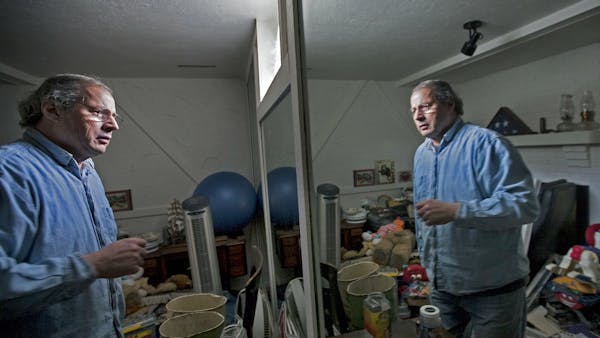Gabe Ciuraru doesn't see many good options for people his age.
At 23, he's waited tables, driven tanks for the Israeli army, taken community college classes and taught Hebrew in St. Paul. Lately he's been selling cosmetics from a kiosk at the Mall of America.
This fall he plans to pursue a degree in sports management at the University of Minnesota. But he'll have to take on a lot of debt, and he's not optimistic it will lead to a good-paying job.
"I have friends that still live at home because they're paying off their student loans," Ciuraru said. "You're chained to your desk. And if you're not, the debt gets bigger."
People who finished high school or college in the past few years came into the job market at the wrong time. The economic downturn slashed pay for young workers and left more of them jobless, even after many went deep into debt to pay for college.
Economists believe they may never recover what they lost in wages and experience. The average Minnesotan under the age of 35 earns about $260 less per month than he or she would have earned at the end of 2005, according to the most recent figures from the Census Bureau. This is in contrast to workers over 35, for whom earnings held steady or rose over the same period.
"If we look over people's likely future lives, when you're part of a generation that comes in with a tough job market and your wages are not so great, you don't recover," said Richard Freeman, a Harvard University labor economist. "They are going to be at a permanently lower standard of living than they would have been had we either avoided this catastrophe or had we had a successful jobs recovery."
Demand for college-educated workers probably peaked around 2000, and the decline since then has affected all young workers, Canadian economists Paul Beaudry and Benjamin Sand say.
As the number of college diplomas in the job market keeps rising, high-skilled workers are forced to take lesser jobs, "pushing low-skilled workers even further down the occupational ladder and, to some degree, out of the labor force altogether," Beaudry and Sand wrote in 2013.
The phenomenon was partly hidden by the housing bubble in the 2000s, but then laid bare by its bursting.
"This has been a terrible decade," said Phil Gardner, director of the Collegiate Employment Research Institute at Michigan State University. "There's only been three years where employers have aggressively hired in the last 12 years."
Morgan Moore, 28, realized in 2008, less than a year into law school at the University of Illinois, that he probably wouldn't end up working as a lawyer.
He had hoped to work as legal counsel for a corporation, but the prospect grew distant as the economy sank into recession.
"That amount of time grew from five to 10 years, to longer than that, to maybe impossible," Moore said. "So rather than wait and see, I decided to pursue other opportunities."
He finished law school so he wouldn't regret quitting, but when he graduated in 2011 he didn't have the money for bar exam prep classes. He couldn't find any work near Chicago, let alone at a law firm. So he spent the summer in his fiancée's mother's basement, collecting food stamps.
Ultimately he moved back to the Twin Cities, where he grew up, in search of any kind of work. He did part-time stints on the sales floor at Sears, at a Byerly's grocery store and parking cars for a valet service.
In February 2012, he started selling cars full time. He doesn't regret his expensive law degree, but it will take a long time to pay down his $80,000 in student debt. He has no plans to buy a house, and he had to sign up for health insurance through MNsure, the state exchange.
"Those of us who were negatively affected by the economy are faced with the consequences of a lost three or four years," Moore said. "That's definitely left an impact."
Bad timing
Since 2008, first-time job seekers have faced a market more difficult than anything their older siblings or parents have seen.
Unemployment for people under 25 hit 21 percent in 2010 and still is well above its prerecession high at 15.6 percent, according to the Bureau of Labor Statistics. The situation is worse for workers under 25 with no college education, whose unemployment rate is 18.6 percent.
Young people who are working have fewer opportunities for advancement, in part because fewer older workers are voluntarily quitting their jobs.
"The longer this goes on, and the longer they're not attached to something meaningful — and there's a lot of young people who still aren't — then they're wasting their human resource investment, which is their education," said Phil Gardner, director of the Collegiate Employment Research Institute at Michigan State University.
Repeated studies show that people who look for their first job during a recession take as much as a 9 percent wage cut. These losses can be permanent, and even when they're not, may fade only after a decade.
The fault lines run through families.
Laura Franklin, 27, and her sister Emily, 32, both went to the College of St. Benedict in St. Joseph, Minn. Emily didn't seriously consider her career until her senior year, yet got a good job four days after she graduated in 2004. Laura, with a 3.9 GPA and a semester as a full-time substitute teacher under her belt, couldn't crack the teaching market in 2009 or 2010.
She wanted to teach third-graders, she said, because they like to learn and are old enough to work independently. She applied for more than 100 jobs in Minnesota and Colorado through the summer of 2009. She drove to job fairs where lines formed out the door for one opening. "You'd just hang your head when you walked in," she said.
The first few weeks without a job offer turned into months, and then the summer passed, and her computer filled with folders of rejected cover letters.
"I was just so defeated," she said. "My self-esteem was just blown. I said, 'I give up. I'm going to take care of babies. This is my life. OK.' "
She worked at a day care called New Horizon Academy, and a year later, took a job as an early childhood teaching assistant for St. Paul public schools, hoping that might lead to full-time teaching. She worked both jobs — 12 hours a day — to cover her bills, including payments on $18,000 in student debt.
The teaching job never materialized, so she took a job at a UnitedHealth call center, which led to a better position at OptumHealth. She gave up hopes of teaching but believes those years made her stronger.
"I can look back and think OK that was awful and such a hard struggle, but I'm so happy with where I am now because of it," she said. "It makes you appreciate it that much more."
One reason for optimism is that as more baby boomers leave the workforce, more jobs should open up for younger workers.
About 57,000 Minnesotans are turning 65 in 2014, and about 31,000 of them are still in the labor force, said Susan Brower, Minnesota's state demographer.
The biggest cohort of baby boomers is now in its mid-50s, so Brower expects the number of retirements to rise over the next 10 to 15 years.
"We do expect to get this boost in terms of replacement job openings," Brower said. "We don't know exactly what the size of it will be."
New perspective
For now, many college students appear to have accepted that it won't be easy to get a good job.
"If you go down to people 22 or 23 years old now, they don't feel quite as disillusioned," said Richard Freeman, the economist. "They understood. The signal was coming out from society. It's amazing to me at least, how easily people adjust to whatever the current situation is."
The scales fell from Jamie Millard's eyes 10 months into her professional life.
She'd been working an unpaid internship since graduating from college in 2009, and she needed money. So she was thrilled to be sitting in an office listening to a man describe her dream job, and then offer it to her. She would be raising money for a small publishing firm, a good one.
"Oh my gosh, this is going to be perfect," she thought.
But the guy saved the worst news for last. The job would be unpaid for six months, he explained, and if she performed well she could apply for the paid position then.
Millard had been smiling, and the grin froze on her face. She said she fought back tears.
"I wasn't strong enough to say, 'What!' " she said.
She turned down the offer by e-mail and gained a new conception of job and career.
She was an English major at the University of Minnesota, but learned how to build websites and launched an online literary magazine, Paper Darts. Now she is co-CEO of BePollen, a networking organization.
She says she banks more on the intangible value of a big network and a rich extracurricular life than on any one particular job. She senses that her lean years have given her lower expectations than older workers — even those just 10 years older.
"Who knows what's going to happen? I feel like my job could be stripped away from me at any moment, so I have to be very thoughtful," she said. "I think that's a new type of thing."
Adam Belz • 612-673-4405
Twitter: @adambelz
Minnesota family's 1-year-old boy dies after fall from Sioux Falls hotel window

'I always wanted this job.' Football coach hits peak with promotion.
Suspect spotted with long gun in Brooklyn Park was teen playing 'Senior Assassin'
Neal: Eulogy for a bad season. May the Wild's future come quickly.

